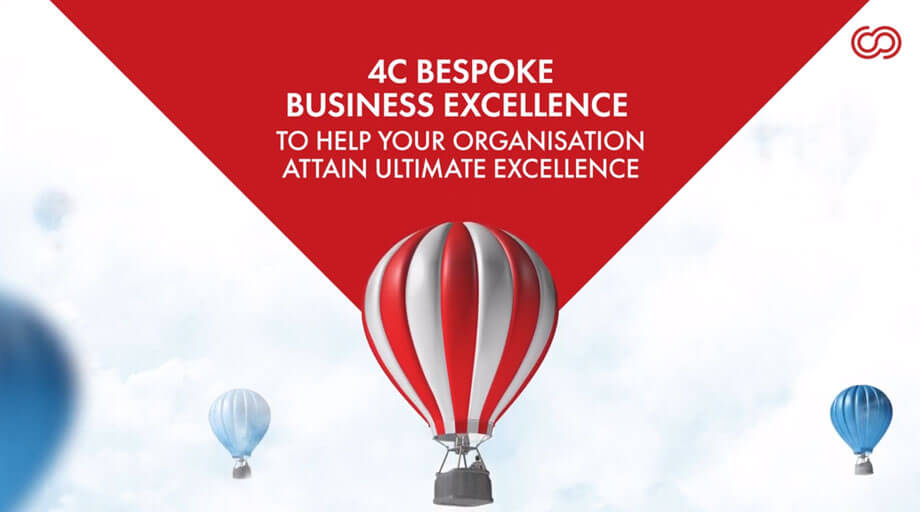Focus area-wise improvement initiatives
The 4C Bespoke BEX model approach consists of the following focus areas. These 6 areas are based on the belief and behaviours exhibited by high-performing organisations.
| focus areas | |||||
|---|---|---|---|---|---|
| leadership | strategic planning | Customer - centric | workforce Management | Operation Management | measurement analysis & knowledge management |
| improvement initiatives | |||||
| Vision, Mission and Value | Strategy Plan | Market Research | Defining Organisation Chart, Roles & Responsibility | Process Mapping and Documentation | Communication Platforms for Staff and Non-staff |
| Stakeholder Relationship Management | SWOT Analysis | Customer Segmentation | RACI matrix | Management System | Information Collection and Analysis (MIS) |
| Succession Planning | Action Planning | Service Standards | Training and Development | 5S / Kaizen / Visual Management | Performance Measurement |
| Leadership Development Programme | Strategic Alliances | Customer Satisfaction Survey | Suggestion Scheme | Lean / Six Sigma / Process / Improvement Tool | Internal & Suppliers Audits |
| Corporate Governance Management | Balanced Scorecard | Customer Relationship Management | Employee Performance Management | ERP | Benchmarking |
| Corporate Social Responsibility | Enterprise Risk Management (ERM) | Service and Product Innovation | Employee Engagement Survey | Supply Chain Management | Knowledge Management |
Improvement Initiatives
Vision, Mission and Value
Helps to identify companies with their Vision & Mission, so that we can produce Value.
Stakeholder Relationship Management
Helps in managing your relationships with different stakeholders and communities.
Succession Planning
Helps to identify and develop new leaders.
Leadership Development Programme
Programme to develop leaders, such as experience sharing, leadership training, and apprenticeship.
Corporate Governance Management
Involves accountability of management’s actions, transparency in business activity, and protection of stakeholders’ interests.
Corporate Social Responsibility
Strategising contribution towards societal goals.
Improvement Initiatives
Strategy Plan
Helps in directing goal setting and resource allocation to achieve desired future results.
SWOT Analysis
Helps organisations to identify strengths, weaknesses, opportunities and threats related to business.
Action planning
Helps to turn your strategy and goals into action.
Strategic Alliances
Agreements between organisations in which each commits resources to achieve a common set of objectives.
Balanced Scorecard
Translates mission and vision statements into a comprehensive set of objectives and performance measures that can be quantified and appraised.
Enterprise Risk Management (ERM)
Helps organisations manage risks and seize opportunities related to the achievement of their objectives.
Improvement Initiatives
Market Research
Assist to ensure that there will be a demand for the product/service and that the requirements of the customer will be met.
Customer Segmentation
A subdivision of a market into discrete customer groups that share similar characteristics.
Service Standards
Defining the service standard that a customer is entitled to receive.
Customer Satisfaction Survey
Helps to understand your customers better.
Customer Relationship Management
Helps to understand the customer groups and respond quickly to changing customer desires.
Service and Product Innovation
Managing how to create, exchange, evolve and apply innovative ideas to the production and delivery of products and services.
Improvement Initiatives
Defining Organisation Chart, Roles & Responsibility
Helps to convey a company's internal structure by detailing the roles, responsibilities and relationships between individuals within an entity.
RACI matrix
Helps in describing the participation by various roles in completing tasks or deliverables for a project or business process.
Training and Development
Helps to raise the competencies and capabilities of employees.
Suggestion Scheme
A system in which employees are given an opportunity to give ideas and suggestions on how to improve the organisation, and are given rewards for useful suggestions.
Employee Performance Management
Helps to develop a systematic approach towards aligning individual and organisation goals (KRAs & KPIs).
Employee Engagement Survey
Helps to measure and monitor employee engagement.
Improvement Initiatives
Process Mapping and Documentation
Helps to map and document what a work process does and what standard it should follow.
Management System
Helps to direct and control an organisation concerning quality. Implementation of QMS/EHS/EnMS, etc.
5S/Kaizen/Visual Management
Helps in continuous improvement of manufacturing processes.
Lean/Six Sigma/Process/Improvement Tool
Help to reduce variation and eliminate causes of defects/errors in processes.
ERP
Helps in integrated management of main business processes.
Supply Chain Management
Helps to synchronise the efforts of all parties.
Improvement Initiatives
Communication Platforms for Staff and Non-staff
Having appropriate channels of communication.
Information Collection and Analysis (MIS)
Concerned with the collection and analysis of information for organisational management and improvement.
Performance Measurement
Helps to measure the success of an organisation, processes, people, programs, investments and acquisitions.
Internal & Suppliers Audits
Helps to review the organisation’s activities and results referenced against Business Excellence Award Models.
Benchmarking
Helps to identify and implement best or better practises.
Knowledge Management
Helps to acquire and share intellectual assets.










